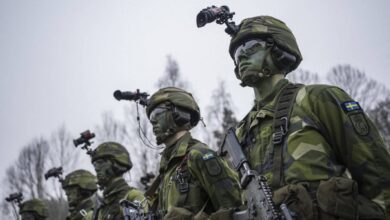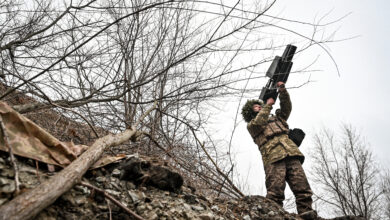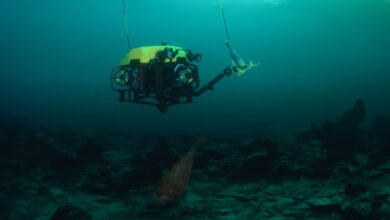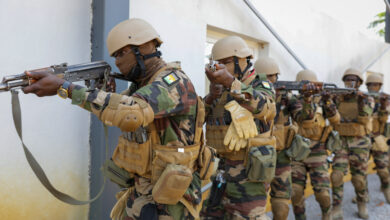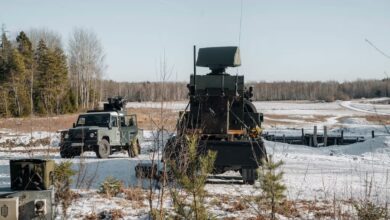The Swedish government plans to send up to 150 special forces personnel and helicopters to join a new multinational military mission in sub-Saharan Africa’s troubled Sahel region, the Foreign Ministry said in release.
“The government has decided to submit a bill to the Riksdag [parliament] proposing Swedish participation” in the France-led special operations Task Force Takuba in Mali, the Monday, March 16 release said. “The Swedish contribution is planned to consist of a helicopter-borne rapid reaction force of a maximum of 150 personnel.”
“Sweden’s participation promotes security in Mali and the Sahel region,” Foreign Minister Ann Linde said, adding that it will also “contribute to the fight against international terrorism and ultimately make Sweden safer.”
“The decision concerns a military operation alongside the larger U.N. mission MINUSMA in Mali,” Defense Minister Peter Hultqvist said. “A Special Forces operation is an extremely competent capability that contributes to the stability of the region and to combating and preventing further spread of terrorism in Europe and Sweden.”
More than 200 Swedish military personnel are already deployed to multinational missions in Mali, including MINUSMA and the European Union Training Mission in Mali.
The Swedish Armed Forces began to plan a possible deployment to the Sahel in February.
France has for months been trying to build support for the new special operations Task Force Takuba that will train, advise, assist and accompany local forces in their fight against Islamic State and al-Qaeda affiliates in the region. Takuba is expected to declare initial military capability in the summer and will be fully operational by the autumn.
France hopes that Takuba will comprise around 500 special forces personnel, and a new French deployment will include around 50 special forces personnel who will form the nucleus of Takuba, although Le Monde reported last week that France will deploy 100 operators.
So far, Estonia and the Czech Republic have also announced plans to contribute to Takuba, and discussions with Finland and Norway are reportedly ongoing, but Germany and the U.S. have declined.
In January, the European Union High Representative for Foreign Affairs and Security Policy Josep Borrell announced plans for an international conference on security in the Sahel on the margins of the European Council meeting on March 26. Europe is battling the coronavirus pandemic with many states closing borders and restricting travel, but a spokesperson for the Council told The Defense Post last week that “for time being” the conference is still scheduled to go ahead.
The French military presence in the Sahel began in 2013 with Operation Serval in Mali, and evolved in August 2014 into Operation Barkhane, which has a mandate for counter-terrorism operations across the region. The Barkhane force focuses activity in insurgent-hit Mali, Niger and Burkina Faso, working alongside local troops and other international operations, including the regional G5 Sahel Joint Force (FCG5S), which comprises troops from Burkina Faso, Mali, Niger, Chad and Mauritania, and MINUSMA, the U.N. stabilization mission in Mali.
In February, Armed Forces Minister Florence Parly said that the number of French troops deployed to the Sahel would increase from 4,500 to 5,100.
France and the G5 Sahel states in January injected new urgency into the counter-terrorism fight, announcing a new Coalition for the Sahel which will see increased coordination between French and local forces. Barkhane and FCG5S forces operating under joint command will focus on the Mali-Burkina Faso-Niger tri-border zone, targeting Islamic State as a priority.
Barkhane already has an international dimension, with European partners contributing troops and equipment. Estonia is to almost double the size of its force protection contingent this year, Denmark has deployed two Merlin helicopters, and three Chinook helicopters from the United Kingdom currently support the operation.
Islamist insurgents in the Sahel
The complex insurgency in the Sahel began in Mali in 2012, when a Tuareg separatist uprising was exploited by al-Qaeda-linked extremists who took key cities in the desert north. Former colonial power France began its Operation Serval military intervention the following year, driving the jihadists from the towns.
But the militant groups morphed into more nimble formations operating in rural areas, and the insurgency gradually spread to central and southern regions of Mali and then into Burkina Faso and Niger.
More than 4,000 people were reported killed in militant attacks in the three countries last year, according to the U.N., and Secretary-General Antonio Guterres has warned that the spiraling violence in the Sahel has spread to coastal states of West Africa.
Many armed groups including Islamic State are active in the Sahel region, but the majority of attacks are attributed to JNIM, which formed in March 2017 from a merger of several smaller groups. JNIM’s leadership has pledged allegiance to al-Qaeda leader Ayman al-Zawahiri.
Since May 2019, ISIS has attributed insurgent activities in the Sahel area to ISWAP, its West Africa Province affiliate that split from Boko Haram in 2016, rather than to Islamic State in the Greater Sahara. ISWAP’s main area of operations is the Lake Chad area of Nigeria, Niger, Chad and Cameroon.
Macron has said the Sahel Coalition would prioritize the fight against ISIS in the Mali-Burkina Faso-Niger tri-border area because it is the most dangerous.




